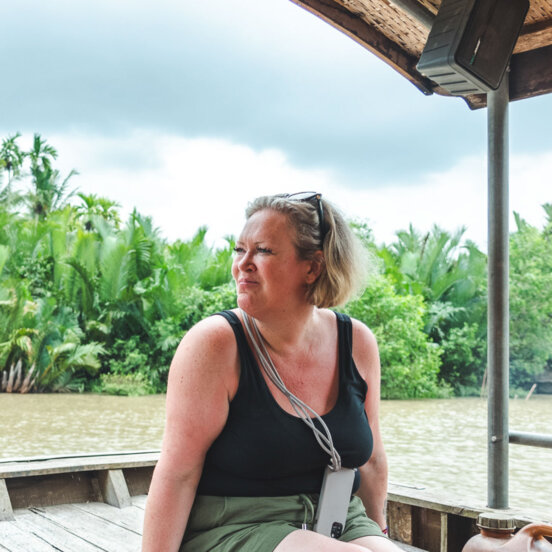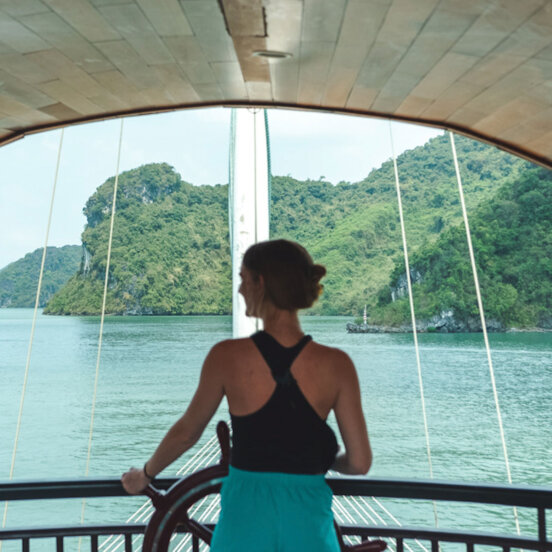Why I wrote a solo travel guide for black women called Black Girls Take World

The travel industry needs updating, fast. That’s why I wrote my book, Black Girls Take World – a travel bible for black women with boundless wanderlust – who love, or want to learn how to love, the act of traveling solo.
It came out last year in the midst of the pandemic when many of us were unsure if we’d ever travel again. But even against that backdrop, I knew I needed to write it.
Solo travel can be transformative for all women, but for women of colour – and in particular black women – it holds special meaning. Many black women are used to living with othering and discrimination in their home countries and so, escaping on a solo trip away can be incredibly freeing. Solo travel on our own terms is a tool of self-control – a way to escape and author our very own travel narrative.

For black women, escaping on a solo trip can be incredibly freeing
Yet many black women are scared to travel solo. For centuries, the world has dictated to black women how they should live, move and exist. In the age of Empire, black and brown bodies were forced to toil in fields and farms, seen only as tools for capitalist production, with women forced to endure the added threat of sexual violence.
The concept of leisure time for black women, quite simply, did not exist until fairly recently. And today, we still see that those who enjoy the greatest freedom of movement are often white and wealthy, with huge socio-economic barriers blocking access to solo travel for ethnic-minority groups.
Contemporary black travelers are still trying to shirk the idea that they do not travel as frequently, or cannot afford to do so. Stereotypes around the type of travel we enjoy, continue to persist. For example, that black people do not hike, or pursue adventure travel, or go on safari.

Stereotypes around the type of travel we enjoy continue to persist
Because of this, there are often women who wish to book a solo trip, but have understandably absorbed many limiting myths about their abilities and their bodies. They have been denied access to leisure travel by an industry that is homogenous and does not cater to them.
My book Black Girls Take World offers tools to overcome this fear. Through essays, advice and recommendations, I explain why the world is wide and why black women should take the leap – and a trip on their own. To travel while black and female is to dispel legacies of mobility impairment and debunk myths which come from the history of restricted movement.
When we review the origins of travel writing as a genre, we can see where many of these myths come from. Travel writing developed in the age of the Empire where it reflected the colonial mapping of the world, imprinting the cultural norms of Europe on the minds of everyone, both at home and abroad.

There’s a real shortage of travel writers of color in the mainstream media
Whether in the form of diaries or reports, the travelogues of soldiers, colonels, slave owners and explorers informed readers back home of how things were and consolidated how they should be. Imaginary utopias, moral voyages and scientific reporting flattened whole continents like Africa – varied in ethnicity, language and identity – as sites onto which European thinkers projected their fears and fantasies.
There’s still a real shortage of travel writers of color in the mainstream media, with the industry often feeling like an Old Boy’s Club. As a black female freelance journalist, I’m often ignored by editors entirely when I pitch, or commissioned to write about how travel intersects with my identity.
But travel writers should be allowed to cover the unbridled joys of travel, too – to write about sunsets that stayed imprinted on their mind forever, the street food that keeps them coming back for more…

Black travelers spent $109.4 billion on travel globally in 2019
The industry is composed of agents and brands who have routinely ignored travellers of color. Yet black consumers are expected to range far and wide in 2022. Pre-pandemic, black travelers spent $109.4 billion on travel globally in 2019 – so just think what this year, with all that renewed appetite and suppressed demand, could bring.
We shouldn’t forget that black women travel solo for the same reasons as everyone else. For adventure and developing deeper connections with themselves and others. For horseback rides in tangled jungles. For swaying in string hammocks on beaches the color of pink salt. For the food, the thrills and the freedom.
And although there’s been a shift in the last 10 years and we’ve seen a more diverse social media-led discourse, with groups and sites such as Travel Noire, We Go Too, Tastemakers Africa and Nomadness Travel Tribe offering content and advice for black travelers. In the mainstream, travel journalism remains incredibly homogenous.

I’ve had so many incredible experiences – from a solo writing retreat in Bali to samba dancing in Rio
I’ll continue to write and share content, because I love connecting with other people and showing the world that black women love to travel solo, too. I have too many incredible solo-travel experiences to recount.
Perhaps the one that involved samba dancing into the early hours with tour guides I’d met that day in Rio’s Little Africa neighborhood. Or the solo writing retreat I took myself on in Ubud, Bali, where I worked on my book against the backdrop of lush jungle and soothing Hindu chanting. Or the many days and nights I lost to meeting new friends in Havana, New York City and Morocco.
Then there are the times I swam with seals in the Galápagos, walked with white rhinos in Zimbabwe and hitchhiked around Colombia. All because I, as a black woman, was eager to see more of the world – and learn more about myself in the process.
Georgina Lawton is the author of Raceless and Black Girls Take World.
Got a story or adventure that could inspire a solo traveler like you? Tag @flashpack on social or email [email protected] to be featured.








